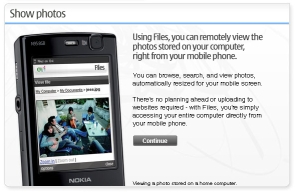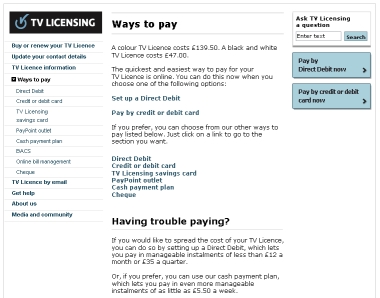Alternative business models for commercial software, or, how the heck do commercial software makers get paid?
There has been a lot of discussion on All About Symbian's comments threads recently about DRM, piracy and commercial software.
To get a bit of perspective on the situation, this article will avoid discussing piracy and DRM directly. Instead, we're going to concentrate on alternatives to the traditional commercial software business model. At the moment commercial software is mostly sold the same way things like books or apples or cars are, you give the makers some money and they give you the product. But how else could commercial software production be funded?
In short, are any of the following business models viable for software? If they're not viable, is there really any alternative to the current model of selling software directly?
Wait wait wait! Why do we even need commercial software? There's some pretty darn good non-commercial stuff out there now!
This is a very fair point, as recent years have seen an unprecedented rise in the quantity and quality of non-commercial applications on both computer and mobile platforms. The rise of the open source movement has helped (though open source software isn't always non-commercial), and the internet has also helped as it lets people distribute their own content worldwide at virtually zero cost.
However, this rise of non-commercial software has been greater in some areas than others. Gaming for example has had a severe lack of quality non-commercial releases, with most freeware games being unofficial clones of commercial titles rather than original works in their own right.
As things stand, there is still a great need for commercial software in many fields. Maybe non-commercial software will adequately cover all fields in the future, but at the moment it doesn't, so we still need commercial software business models.
Some alternative business models
1) Advertising This is perhaps the most talked-about and obvious commercial alternative to pay-for software, as it's worked extremely well in the media on radio, television and newspapers. This goes beyond just free stations and papers, even pay-for media is often heavily subsidised by the advertising it carries. Could it work for software?
This is perhaps the most talked-about and obvious commercial alternative to pay-for software, as it's worked extremely well in the media on radio, television and newspapers. This goes beyond just free stations and papers, even pay-for media is often heavily subsidised by the advertising it carries. Could it work for software?
There are many ways of doing advertising of course:
Adverts: One or more advertisers buy space within the application to display their own advertisements, similar to text or banner ads on websites.
Sponsorship: Like adverts, but the advertiser's product is more closely intertwined with the application itself, for example it may even be included in the application's name ("Colgate Spreadsheet 4.0" etc).
Product Placement: Even more intimate and sly than sponsorship, this involves including the product within the application as if it wasn't an advertisement. The most obvious example in software is in gaming, e.g. characters wearing Nike shoes etc.
Advantages:
- Advertising-funded software could be distributed at little or no direct cost to the user which can maximise its userbase. It should be remembered though that we all pay for advertising indirectly even if we don't use the product. Advertising money comes from products we buy, so their prices have to be slightly higher to cover the cost of the advertising.
Disadvantages:
- Banner adverts may not work well on mobile devices due to smaller screen size and generally more restricted internet use.
- Advertising banner code can be stripped out by pirates, though this is less likely with sponsorships and product placement.
- Advertising can be blocked on the device by people using ad-blocker software.
2) Subscription-based Web Services Web-based software is where the application runs on a server owned by the publisher, and you access it remotely from your computer or mobile device. With subscription-based web software, instead of buying it as a one-off product you pay a regular subscription to access the service, very much like paying a monthly fee to access a mobile phone network or a broadband ISP. When you don't want to use it any more, you just stop paying the subscription and stop accessing the service.
Web-based software is where the application runs on a server owned by the publisher, and you access it remotely from your computer or mobile device. With subscription-based web software, instead of buying it as a one-off product you pay a regular subscription to access the service, very much like paying a monthly fee to access a mobile phone network or a broadband ISP. When you don't want to use it any more, you just stop paying the subscription and stop accessing the service.
(Many web-based apps such as Gmail don't have a subscription and are funded by advertising, but that business model is covered by the "Advertising" section above.)
Advantages:
- Users are charged based on how much they actually use the software, so it can be very cheap or free to try the software, but the publishers still get paid a substantial amount if the user carries on using it in the long term.
- Because users pay the most for the software they use the most, this gives publishers a very strong incentive to create software with long-term appeal, and to update it as often as possible.
- As long as people can easily switch between rival services, web-based services will become extremely competitive, which should mean higher quality and lower prices for the consumer.
Disadvantages:
- Requires an internet connection to use the software, which may not always be possible or economical for everyone, especially on mobile devices.
- Not all software is currently suitable for running remotely, for example graphically-intensive games.
3) Non-Software Spin-offs The original Star Wars films earned about $4 billion at the cinema. The spin-off merchandise however earned about $10 billion. In other words the franchise as a whole got most of its income from non-film sales, even though the films themselves were the basis of the franchise. Perhaps if the films had been screened for free, the customer base for the merchandise would have been even bigger and the merchandise sales even higher.
The original Star Wars films earned about $4 billion at the cinema. The spin-off merchandise however earned about $10 billion. In other words the franchise as a whole got most of its income from non-film sales, even though the films themselves were the basis of the franchise. Perhaps if the films had been screened for free, the customer base for the merchandise would have been even bigger and the merchandise sales even higher.
Real life is more complicated than that of course, the rights to a product and its spin-offs are often split between many different companies, but the principle has been very strongly established that spin-offs can sometimes be more lucrative than the original product. Nowadays it's perfectly normal for a film to make a certain sum at the box office and then earn many times that amount from the DVD release, and a cinema release is often in effect just an advertisement for the DVD. Some films actually do very badly at the cinema but get into profit from their DVD sales, and in those cases they're entirely dependent on spin-offs, with the core product relegated to being a "loss leader".
Could this spin-off effect be exploited by software makers? In fact there have already been many commercial spin-offs of software, for example film franchises based on famous games such as Tomb Raider and Resident Evil, and in the business field there are software makers who earn a profit from providing official support to their users for a charge. On the other hand, these tend to be the exception rather than the rule, and most applications have little or no potential for commercial spin-offs of any kind. At the moment this is especially true for mobile applications.
A Spin-off business model is similar to an advertising-based business model, but the software only advertises products based on itself.
Advantages:
- If a piece of software is very popular, its spin-offs can bring in more profits than the product itself (the first Tomb Raider film earned $250 million at the cinema and even more from DVD sales, which is far greater than any Tomb Raider game has managed).
Disadvantages:
- The potential for spin-offs is extremely limited for most software (even something as widely-used as Tetris is only really profitable as a game).
4) Taxes This is perhaps the most radical alternative to direct sales.
This is perhaps the most radical alternative to direct sales.
Many countries have a Television Licence system, which is actually just a television tax, but the word "licence" sounds less political so that's used instead. The money collected from TV Licences is used to directly fund public broadcasting, and such content can be distributed free of charge without any adverts because the programme makers' income is guaranteed by the government. Even countries which don't have an actual TV Licence still pay for a certain amount of public broadcasting using money from taxation, which amounts to the same thing.
Could a similar arragement be used for funding software, either through some kind of direct "computing licence" or through money from general taxation?
Would that still count as commercial software? Or would it represent a kind of "public software", analogous to public broadcasting? It certainly wouldn't be freeware because it would be created by paid professionals, and it wouldn't necessarily be open source, but it also wouldn't be subject to direct market forces either because its funding would be guaranteed in advance.
Actually a lot of publicly-funded software already exists, often developed for research projects at academic institutions. Using taxes to make software doesn't necessarily exclude the commercial sector though, public broadcasting is increasingly done by independent production companies, and public software is often created using commercial contractors who earn a profit from their work.
Advantages:
- Professional software makers could earn their living making software that concentrates on the needs of their audience without worrying about sales figures.
- Unprofitable niche audiences could be catered for as part of the public service ethos.
- Software makers could take more risks, and put critical acclaim above commercial success.
Disadvantages:
- If a Computing Licence was expensive enough to fund a significant amount of software development, it would probably become politically unpopular too, and face the same kind of dilemmas that public broadcasters currently face.
- Publishers entirely at mercy of government agency.
- If general taxation was used instead, it would be a soft target for government cuts.
- Many politicians and tax-payers would object to public software on the grounds that government shouldn't be funding services already provided by the free market.
- Free trade treaties may actually forbid this kind of direct large scale government funding of software.
5) Comes With Software
 It's a fairly common business model to sell a platform at a loss and make profit from the content. Many games consoles do this, selling the hardware at a loss and receiving the hardware costs plus profit from the games sales. But what if this was reversed? What if the content was given away and hardware sales covered both the content costs plus profit?
It's a fairly common business model to sell a platform at a loss and make profit from the content. Many games consoles do this, selling the hardware at a loss and receiving the hardware costs plus profit from the games sales. But what if this was reversed? What if the content was given away and hardware sales covered both the content costs plus profit?
In a way this is happening with Nokia's upcoming "Comes With Music" scheme where you buy a CWM phone and it includes unlimited music downloads for a year at no extra cost. The price of a CWM device is higher than without CWM, and this extra cost is used to pay for the music, with Nokia making a profit from the hardware itself. Could this happen for software?
It would certainly be more difficult to do with software. For CWM Nokia only had to strike deals with three or four large companies, but software is much more splintered and far more companies would have to be negotiated with. Perhaps the main potential deal-breaker is the difficulty of sharing out the money. If unlimited software downloads added $100 to the price of a compatible device, how would that $100 be divided between the publishers that made the software?
One alternative to all-you-can-eat is a more limited number of downloads. For example someone might buy a particular device and be entitled to 50 free applications or games, which would in theory make it far easier to divide up the money and make the user much more selective about which apps they download. That would still leave the user in the lurch once their free allocation was used up though, and they would have to go outside this business model when that happens.
Advantages:
- Consumers would be free to download a large or unlimited amount of apps and games, which would let them get the most out of their device.
- The hardware manufacturer offering the free software would be guaranteeing publishers at least some income.
Disadvantages:
- Restricts size of software market to whatever extra cost is added to device (for example $100 per device). You can slice a pie as often as you want, but its total size stays the same.
- Publishers entirely at the mercy of hardware makers.
- Too many publishers and apps would make phones expensive or dilute the amount received by each publisher.
- Too few publishers and apps would restrict the range of software available and weaken the platform.
So, how should software be sold?
No one knows, at least not yet.
We'll only find out if and when these different models are tried in the long term, and even then we won't know exactly what the future holds as circumstances may change. For example, software sold as an online service seemed impossible in the early days of dial-up modems during the 1970s and 1980s, but the spread of cheap "always on" broadband connections for fixed and mobile devices has made it a very plausible business model.
The one thing that all of these business models have in common though is that money is somehow put in the pockets of the people who created the software, so that they can create more software. Piracy on its own does not do this, so any talk of piracy itself as a business model for commercial software is misguided. All that piracy offers is a method of distribution, not a source of income.
If we're talking about commercial enterprise, the money has to come from somewhere. A business without money is like a car without petrol.
Tzer2, All About Symbian, 24th Aug 2008
